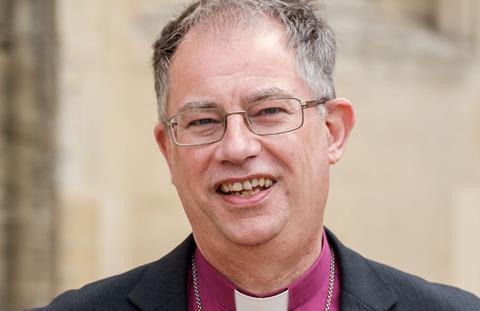Steven Croft is the Bishop of Sheffield. He was previously Archbishop Rowan Williams’ missioner and leader of the Fresh Expressions team. Deputy editor Ruth Jackson caught up with Bishop Steven to hear about some of the exciting youth initiatives taking place in Sheffield.

RJ: There’s been lots of budget cuts, particularly around provision for young people. Why do you think it’s important that the Church steps into that gap?
SC: It’s vital that the Church is proactive in their work with children, young people and families. I think young people need guidance and need to find meaning in their lives as we go forward into the 21st Century. Sources of meaning in wider culture are few and far between, so it’s vital for the Church to engage young people who are facing an increasingly complex world and issues. The Church needs to offer help and support for them in those things. The level of building relationships and community across the ages and offering guidance means the Church has a great deal to offer. There has been a withdrawal by local authorities and we’re now beginning to see the effects of that in all kinds of ways on young people.
Recently there has been a lot of concern, rightly, about the state of mental health services for the young. I think it’s vital that the Church is engaged and involved there. The Church always has a responsibility to communicate the Christian faith as best we can to the generation growing up. I think the Church in this country needs to dramatically reassess its investment in the next generation and, if possible, increase it.
RJ: Do you think the Church is uniquely equipped and placed to be able to do that?
SC: I think the Church has a great deal to offer. Not only in the resources that we can deploy to employ children’s and youth workers and in the practical facilities that often lie unused for most of the week in many church communities, but also in the Church’s immense ability to tap into the gifts and resources of volunteers and to draw out that volunteering ministry from people outside the church as well as inside. We also have immense access to people of every age, social class and background. I was in a church yesterday which has started a new service for families with young children, and there was every age represented. The youngest was a few weeks old and the oldest 101! The Church, I think, is the only organisation, the only community in society that draws together people across the age ranges.
RJ: Can you tell us about what’s going on in Sheffield?
SC: We were in a position a few years ago where lots of good youth work was being done by the larger churches – we have quite a lot of them in Sheffield. But the small and medium size churches are the majority and many of them had not been engaging in new ways with children, young people and families work for some time. We tried to address that in a number of ways.
The Church always has a responsibility to communicate the Christian faith as best we can to the generation growing up
Firstly, we tried to network young people in a deeper way. We’ve done that principally through building a network of leaders and an annual development day for young people called ‘breathe deep’. That’s happened three times now and it’s grown year by year. People typically come in small groups from smaller churches across the diocese. Young people get the sense that they are part of something much bigger. That’s been a really high priority for me as bishop – to be there and be involved in that.
Secondly, through investment in training children’s and youth workers who are mainly volunteers. Mike North, our children’s and youth advisor, has developed a pioneering training course called Aurora with the YMCA and Cliff College. We’re seeing a really steady growth of people coming through that into youth and children’s ministry in local churches.
The third element has been the Centenary Project. It’s been fantastic to see it grow. When I first came to Sheffield seven years ago, we were in a position of trying to make money available to small parishes for different forms of mission including children’s and youth work. We found that parishes had to apply for funding and then go through the process of employing a youth and children’s worker. Very few did because they didn’t have the confidence and resources; we needed to give them much more support. We reflected on that carefully and the diocese took a hugely courageous decision to set aside over £1m of our very limited reserves to invest in children, young people and family work. We needed to do more than just make money available and so we employed two people to lead the Centenary Project. Their task is to work with local churches and guide them through the whole process of applying for funding and designing a role; they also mentor the Centenary Project workers. We’re creating and building a network of people. We’re fully funding project workers in some areas. In some, we’re part-funding and in other areas we’re offering support, but the local parish is funding the role. The take up has been great; we’ve had huge amounts of interest. We’ve got the first four Centenary Project workers in post and they’re beginning to do really good work. We’re looking forward to the next tranche of workers coming into post in the next few months.
RJ: Have you already seen effects? What are you hoping to achieve?
SC: We have seen some impact surprisingly quickly. Some of the four workers have emerged from the local community and some have moved to the area to do the work which is fantastic. They’re incredibly able and this funding and the structure we’ve put in place has set them free. They’re doing things in very creative ways – because the project has been really thought-through, at the level of local church support, they’ve been able to get off to a flying start in each context. They’ve been able to do significant new things and start new projects in their first few months. We are seeing evidence of fruitfulness.
What we want to see overall is the number of workers and the quality support we give to them grow and develop, so that we have a growing network of workers across the diocese. We want to see every parish catch a fresh vision of what work with children and young people means in 2016 and going forward. As a diocese we’re very committed to a vision of growing Christ-like, sustainable Christian communities in every place across the diocese including among children and young people. We want to see that go from strength to strength. It’s been a hugely important message to say that, as a diocese stewarding the funds we’ve been given, we want to prioritise investment in youth ministry going forward.
RJ: Presumably you’ve seen a lot of collaboration between churches and other organisations?
SC: Yes we have and we’re massively open to that in the future. We encourage our Anglican churches to work in mission partnerships with one another. Several of the Centenary Project workers are working across several churches already, which multiplies their effect and they’re encouraging people to work ecumenically where they can. We think the impact will be really significant and it’s a really positive story of growth and life that encourages the whole diocese.
The Church is the only organisation which draws together people across the age ranges
RJ: Do you think that this is something that could be replicated elsewhere?
SC: I think it has a really significant capacity for replication. The major challenge for the Church of England and other denominations is how to restore confidence in youth and children’s ministry in smaller churches with very small resources. It’s not just about supplying the funding, although that is a really important element, it’s also about providing the right amount of positive and proactive support for churches and new workers as they come into post.
RJ: What do you think youth workers can do to stop young people leaving the Church?
SC: I think the principles of making Christian disciples are always the same. The Church in every generation needs to remember them and reinterpret them differently. For me, the place I always go is the story of the Emmaus Road. The principles are forming community, teaching, nurturing people in the scriptures, leading them into an encounter with the living God and equipping them in mission. I think we need to go on doing that in each stage of young people’s development in ways that are appropriate. The churches that I see in the diocese of Sheffield which are really effective at nurturing children and young people through to mature Christian faith are the churches which engage in creative and age-appropriate ways. I think the principles are as old as the Christian faith itself but the means by which we do it will vary. I think the whole Church, including youth and children’s workers, needs to be hopeful and confident that we have a message that is as appropriate, life-giving and meaningful to the generation growing up as it always has been.
RJ: How do you think we can reach young people who have no intention of setting foot in a church?
SC: I think the principles are about being there, being present and being willing to serve people wherever we can. We can draw alongside young people in creative ways and I think the Fresh Expressions movement has generated some ideas of how to do that – just being alongside people, loving and serving them. Also I think the resurgence we’ve seen in chaplaincy-style ministry in schools and other places where young people gather is also critical to that continued engagement so young people are encountering Christians in the places where they are and the seed of the gospel is hopefully being sown in ways that will bear fruit later in life.
RJ: Where do you see youth work in ten years’ time?
SC: I can’t really see ten years ahead because I think we’re in a time of really interesting change and opportunity for the Church. But I think the next five years are going to be, I hope, about increasing investment and confidence in children’s and youth work in the life of the Church. One of the Church of England documents that has had significant effect at the level of parishes and dioceses is called From anecdote to evidence. It says, on the basis of solid research, that the most effective investment a local church can make if they’re going to have an additional appointment, is in children’s and youth ministry. I think that message has been heard widely across the Church and I think that in five years we will see that investment increase as we engage with the challenge of aging congregations and the need to connect with the next generation. So, I hope and pray that will lead to growth in children’s and youth ministry in the five years beyond that.


































